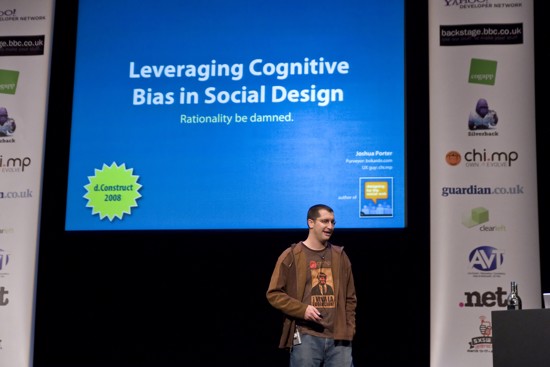Leveraging Cognitive Bias in Social Design @ dConstruct 2008

Photo credit: Jason Garbera
Joshua Porter talked about the various biases that people have and how being aware of them can make our sites more effective. You might want to encourage more people to sign up to your site, or to incourage people to behave constructively in a forum. Understanding our natural social biases can help you do this and it's not evil as long as you've got good intentions.
He opened by showing us a video of a lift experiment where a test subject copies what the other people in the lift are doing. This starts with the direction he's facing in the lift and ends with him taking his hat off, and even putting it back on when everyone else does. So, if people tend to do what the majority do, then on a social site we can show off our power users so they're more prominent and see as the norm and this will lead new users to mimic them.
People are more averse to loss than they are in favour of gains. So, avoiding a loss is a more powerful suggestion than gaining a benefit. It won't always be appropriate, but he suggested that you frame site features as avoiding a loss, if you want to make them more appealing.
One of my favourite biases was the ownership bias. We feel more strongly about things that we own. There was an experiment with two randomly chosen groups of people. One group was asked to say how much they would pay for a mug on the table and another group were given the mug for drinks while they did a range of activities, then they were asked how much they'd pay for it. The people who were given the mug, on average thought it was three times as valuable.
This lead him to talk about the sign up problem. When you're asking someone to sign up for your service, you're typically asking them to change their behaviour and stop using another service. As they currently feel like they own that service they think it's three times better than it really is. As we own the service that we're trying to make them use, we value our service about 3 times as much as we should. So, when you add these two affects together there is a nine times difference to overcome, so your new service better be really good indeed, or we try to cushion the amount of behaviour change that is required.
Someone suggested in the questions that using socialogy in this way was evil. Joshua countered it pretty well. It can be evil if you use it to sell evil things that people don't need. However, if you offer a service that you really believe in then you need to think about this stuff if you want to succeed.
If this sounds interesting, there are MP3s and transcripts of the dConstruct talks.
